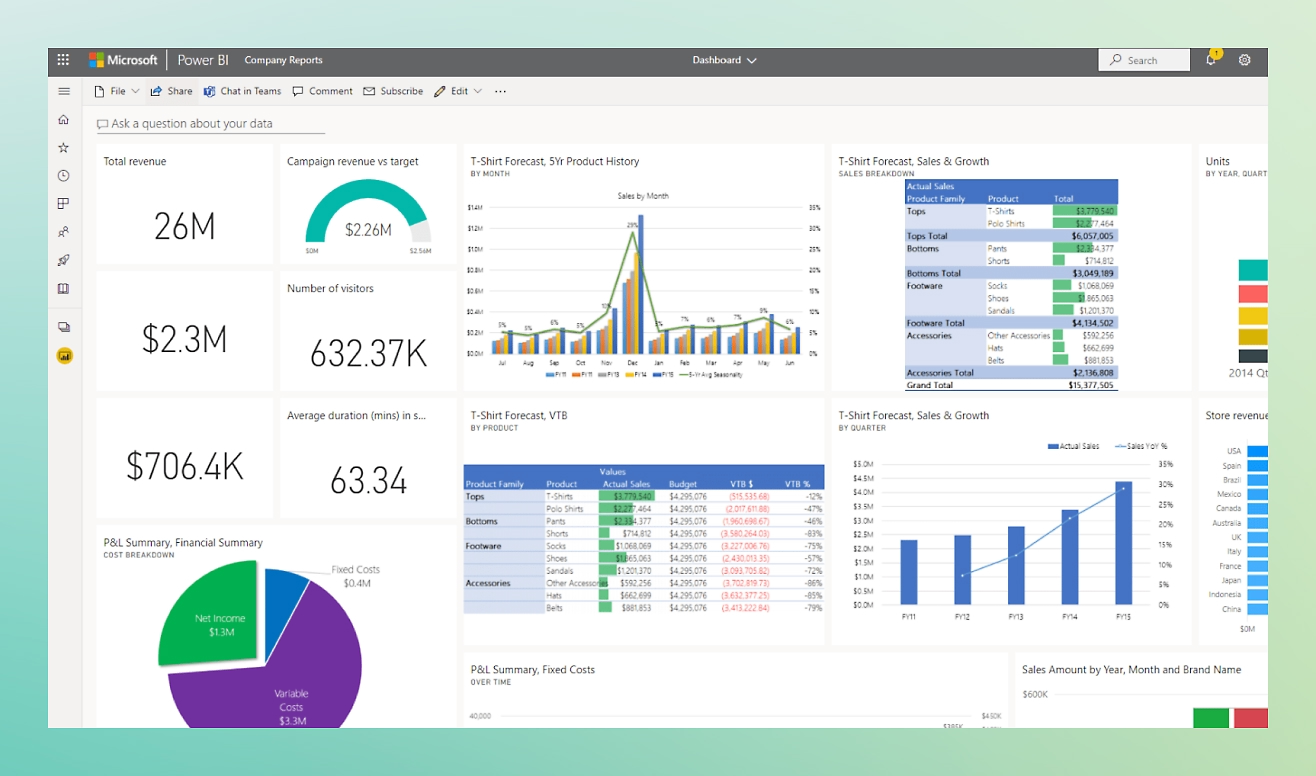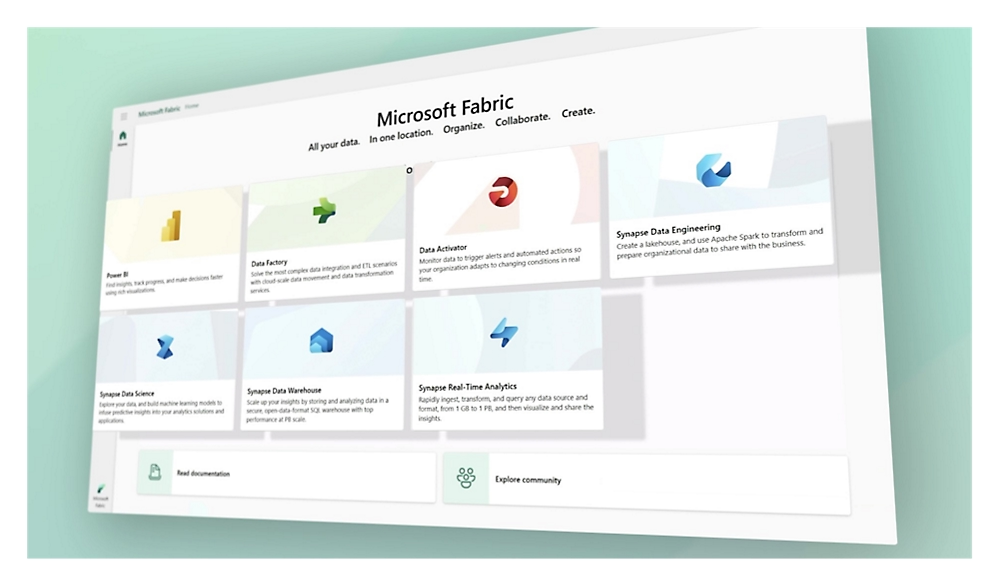
Power BI Premium transitions to Microsoft Fabric: Everything you need to know
A few weeks ago Microsoft announced its plans to retire various Power BI licensing and purchasing options by the end of 2024, which means that Power BI customers will have to purchase Fabric licenses and migrate their existing workspaces. This change will bring numerous benefits to Power BI customers thanks to the new and improved capabilities offered by Microsoft Fabric, and here are all the details about this transition and what you should do.
Power BI Premium to Fabric Transition
Since its introduction in 2023, Fabric, which combines the best of Power BI, Azure Synapse Analytics, and Azure Data Factory to create a single unified software-as-a-service platform, has become a superset of Power BI Premium. This means it has all the capabilities of this service plus six other core workloads. All customers using Power BI SKUs will need to migrate to Microsoft Fabric as soon as possible, as these will cease to be available on January 1, 2025. The migration is not complicated, but it can create disruption, so customers affected by the change must purchase and deploy new Fabric capabilities, migrate existing Power BI workspaces, and recreate scheduled jobs.
Who is affected by this change?
- Power BI Premium P: corresponds to customers using Premium SKUs P1 to P5, whose main license change is the loss of dual-use rights for Power BI Report Server Local.
- Power BI Premium EM and Azure Power BI Embedded: these are customers using SKU EM or A who will need to license their Power BI read-only users with Power BI Pro licenses. They will also need to upgrade to an F64 (or higher) SKU that does include read-only rights.
- Existing customers without an Enterprise Agreement (EA) contract will be able to renew their Power BI Premium capacity subscriptions through January 1, 2025. Customers with a renewal date after January 1, 2025, will be required to replace their Power BI Premium capacity subscription purchase with the Fabric capacity purchase at the end of their contract.
- Customers with an existing EA contract may continue to renew their Power BI Premium capacity purchase annually until the end of their EA contract. If the end of the existing EA contract is after January 1, 2025, they must transition to Fabric capacity once the contract has ended to continue using Microsoft Fabric.
- Customers using a sovereign cloud will not be affected by this retirement, as they do not currently have access to Microsoft Fabric.
If you have more questions on this subject, you can consult the most frequently asked questions about Power BI Premium and its transition to Fabric on Microsoft’s official website.
Microsoft Fabric Capability Benefits
Customers who migrate their purchase to Fabric Capacity will enjoy a variety of additional benefits. Fabric Capacity is MACC-eligible, which means Fabric customers can apply their Fabric spend to their MACC commitment. There is also a pay-as-you-go option for Fabric that allows capacity to be dynamically increased or decreased and paused as needed. Fabric Capacity customers can also leverage smaller compute SKUs that start well below the entry-level Power BI Premium SKU. In addition, Fabric Capacity customers will gain access to Azure-exclusive features such as access to the trusted workspace for OneLake shortcuts and managed private hotspots for Spark. These features are native to Azure and are not available to Power BI Premium Capacity customers. All in all the most important benefits of migrating to Fabric for Power BI users are:
- Unified data ecosystem: Fabric seamlessly integrates warehousing, data engineering data science, and real-time analytics with business intelligence capabilities. This makes for a more consistent data management strategy, reduced complexity, better data governance, streamlined operations, and smoother workflows.
- Greater scalability and flexibility: Fabric has a new licensing and pricing model that provides greater flexibility compared to traditional Power BI Premium capabilities. In addition, the “pay-as-you-go” model allows organizations to scale their computing and storage resources according to their specific needs. This is especially beneficial for organizations with fluctuating data workloads.
- Advanced analytics and AI capabilities: With Fabric, AI capabilities are introduced that allow for real-time queries, as well as going beyond traditional data analytics. This translates into greater speed and efficiency, discovery of information and trends, better decision-making, etc.
- Improved collaboration and governance: The Fabric environment enables teams to work together on data projects more effectively through version control, workflow management, and role-based access. In addition, the unified governance framework helps organizations maintain control over their data assets (data lineage, auditing, and compliance).
Convert Power BI Premium P1 to Fabric
Migrating from Power BI to Fabric involves reallocating your workspaces to the new Fabric capability. Administrators can even assign workspaces in bulk to speed up the process. You will be able to access your Power BI and Fabric artifacts for at least 90 days after your Power BI Premium capability subscription ends. During this period, you will be able to migrate your workspaces without fear of losing access to your existing work.
By transitioning to Microsoft Fabric, Power BI users are positioning themselves for the future. The platform is designed to adapt to new technologies and data paradigms as they emerge, ensuring that organizations stay at the forefront of innovation. But, if all this seems too complicated or you don’t know how to get the most out of Microsoft Fabric, Plain Concepts can help you. We offer you a Microsoft Fabric Adoption Framework with which we will evaluate the technological and business solutions, we will make a clear roadmap for the data strategy, we visualize the use cases that make the difference in your company, we take into account the sizing of equipment, times and costs, we study the compatibility with existing data platforms and we migrate Power BI, Synapse and Datawarehouse solutions to Fabric.
MSFT Fabric Day | The power of data in the age of AI
For all those who want to learn about all these changes and become an expert in all that Microsoft Fabric has to offer, at Plain Concepts we have organized the MSFT Fabric Day, a unique event at the Torre Picasso, where our Madrid offices are located, on November 26th. During the day we will explore in depth this comprehensive platform designed to transform data management in the cloud, improve governance, and enhance artificial intelligence in organizations. This is a unique opportunity to learn about the possibilities, challenges, and best practices of this solution from experts from Microsoft, Plain Concepts, and Snowflake. Places are limited and will sell out quickly, so don’t miss this exclusive day to explore the latest innovations in technology with the best experts!






